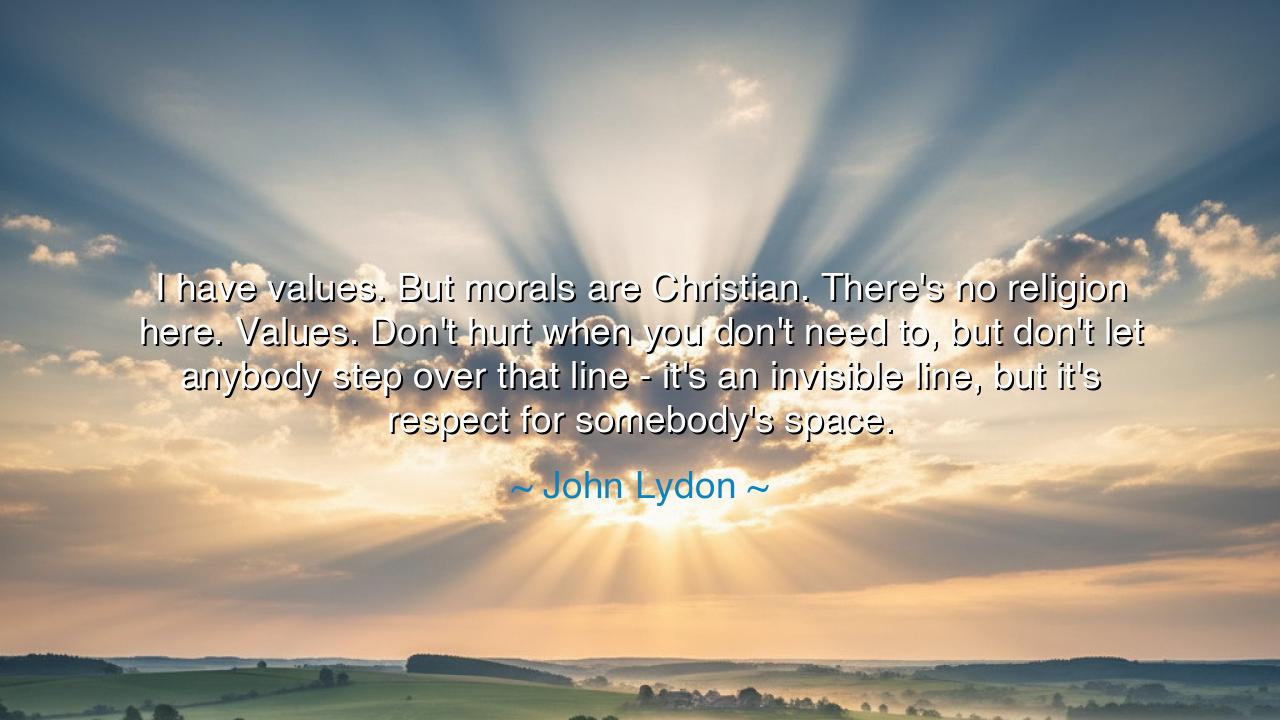
I have values. But morals are Christian. There's no religion
I have values. But morals are Christian. There's no religion here. Values. Don't hurt when you don't need to, but don't let anybody step over that line - it's an invisible line, but it's respect for somebody's space.






In the days when men measured their worth not by possessions but by honor, there were those who stood apart from both faith and law, guided instead by an inner compass — a flame ungoverned by temple or king. So spoke John Lydon, a voice of rebellion and raw truth: "I have values. But morals are Christian. There's no religion here. Values. Don't hurt when you don't need to, but don't let anybody step over that line — it's an invisible line, but it's respect for somebody's space." His words are not a rejection of goodness, but a declaration of freedom — the claim that virtue can live without the robes of dogma, and that respect for another’s soul can spring from one’s own inner justice.
In the ancient way, values were the marrow of character. They were not written on stone tablets, but upon the heart. To live by values is to live by the natural law written by the winds and the blood of time: do no harm needlessly, but defend your ground with courage. This is the balance between mercy and might. It is the discipline of those who know compassion’s worth, but also the danger of allowing others to trample the self. The invisible line of which Lydon speaks is that unseen boundary where kindness ends and self-respect begins. To cross it is to lose the sacred equilibrium of dignity.
Consider the tale of Marcus Aurelius, the Roman emperor-philosopher. He ruled with temperance, showing restraint even toward enemies. Yet when deceit and tyranny sought to overtake his realm, he stood firm, unmoved by threats or flattery. His strength was quiet, his justice precise. He did not act from religion, but from virtue, guided by reason and the innate sense of what was right. Like Lydon, Marcus knew that one can be good without sanctimony, moral without being bound to any creed. His “invisible line” was the same: a border drawn by honor, unseen but felt in the marrow of all who live truthfully.
The absence of religion in Lydon’s words is not a void, but a liberation — the soul’s refusal to outsource its conscience. He speaks for those who build their temple within, whose altar is the quiet understanding that kindness is not granted by scripture, but chosen in every breath. This is a form of spiritual independence, the highest act of moral courage: to choose the right without the promise of heaven, to stand against wrong without fear of damnation.
But there is also the warning: “Don’t hurt when you don’t need to.” These words echo the wisdom of the ancients — the samurai who drew their sword only in necessity, the healers who cut only to cure. Mercy is not weakness; it is control. To harm without cause is to become a beast. Yet to allow harm upon yourself, to let others cross that line of respect, is to deny your own worth. The wise must therefore guard both compassion and boundaries, like twin flames that sustain the balance of the spirit.
In every age, there come those who test our borders — the ones who mistake kindness for submission. To them, the silent but unwavering spirit must answer: Here, and no further. The line of respect must be drawn even when unseen, for it marks the difference between harmony and humiliation. In this truth, there is both fire and peace — the fire to defend, and the peace that comes when no one is trampled beneath pride or fear.
Thus, the teaching is this: live with values, not borrowed morals. Let your kindness be deliberate, your strength unwavering. Do not strike unless it is to protect the innocent, and never bow so low that your soul forgets its height. Respect others’ space as sacred, but keep your own as holy ground too. Speak truth, even when it burns your tongue. Guard your invisible line as the ancients guarded their gates, for it is the fortress of your dignity and the measure of your humanity.
And so, let each who hears these words remember: goodness needs no crown of faith, and courage no blessing from the altar. It is enough to live with integrity, to act with respect, and to stand, unwavering, within your own invisible circle of light.






AAdministratorAdministrator
Welcome, honored guests. Please leave a comment, we will respond soon